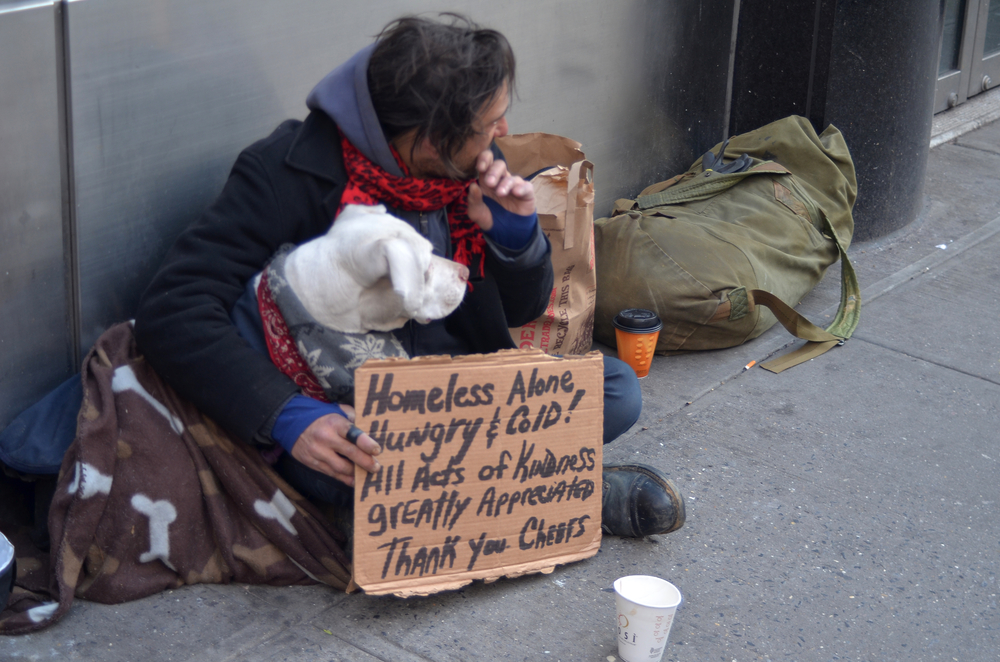 Over the summer, Fox News and the New York Post joined forces in the noble journalistic endeavor of shaming homeless people in New York City. The New York Post sent more than a dozen reporters to follow around just one homeless man and plastered a picture of him on their cover. Twice. The O’Reilly Factor’s Jesse Watters braved treacherous spots like Penn Station to ask homeless people about their drug habits while looking vaguely disgusted. Joe Scarborough ranted self-righteously (and inaccurately). All of this was most likely a not-very-subtle attempt to tie visible homelessness to the administration of Mayor Bill de Blasio.
Over the summer, Fox News and the New York Post joined forces in the noble journalistic endeavor of shaming homeless people in New York City. The New York Post sent more than a dozen reporters to follow around just one homeless man and plastered a picture of him on their cover. Twice. The O’Reilly Factor’s Jesse Watters braved treacherous spots like Penn Station to ask homeless people about their drug habits while looking vaguely disgusted. Joe Scarborough ranted self-righteously (and inaccurately). All of this was most likely a not-very-subtle attempt to tie visible homelessness to the administration of Mayor Bill de Blasio.
Although conservative media outlets conveniently discovered the city’s homelessness crisis when the progressive Mayor entered office, homelessness in the city has steadily increased since the mid-2000s. Today there are close to 60,000 people sleeping in city shelters, according to the Coalition for the Homeless, and an unknown number of people sleeping on the city’s streets.
And it’s not a huge mystery why. Advocates for the homeless attribute the spike to two factors: Mayor Michael Bloomberg’s homelessness policy, which, through an impressive feat of magic oligarch thinking, involved taking rental subsidies away from poor people. And the massively high cost of housing in the city. Rents have increased by 32 percent since 2002 citywide –– 90 percent in some parts of town. The average rent in Brooklyn is well over $3,000. Meanwhile, New York City’s minimum wage is $8.75. Unsurprisingly, evictions are up.
In what could lightly be called an ironic twist, it now looks as if wealthy residents are getting turned off from renting in parts of the city with visible homeless people — and apartment brokers are not happy about it. DNA Info reports:
Brokers have noticed that many of their clients are increasingly reluctant to rent or buy an apartment when they spot a homeless person nearby.
A woman looking for a rental near her job in Hell’s Kitchen found a studio in a walk-up that was “just right” even though her broker Talia McKinney had to politely ask the homeless person sitting on the steps to move when they entered. But on the way out, the woman was turned off when that same homeless person returned with company and a cup asking for money on the building’s stoop.
“Instead she ended up moving into a more expensive doorman building in Chelsea because she was worried about having someone enter in behind her,” said McKinney, of BOND New York.
A 27-year-old who owns his own investment firm was house hunting with his younger brother and was about to buy a 1,600 square-foot loft in a full service building in Chelsea listed for $2.5 million. But after leaving the West 25th Street building, the brothers rescinded their offer.
“They saw a guy who didn’t have his shirt on, who was passed out face down with a beer in hand in broad daylight,” their broker Philip Scheinfeld of Miron Properties recounted.
To be fair, there are some homeless people who, due to mental illness or addiction, may act in a way that could be percieved as threatening (though in general the homeless are much more likely to be victims rather than perpertrators of violent crime). That might be scary and unpleasant, especially for parents with kids in tow.
And chronic street homelessness is a big problem that many cities, including New York, are failing to resolve, which is understandably frustrating for everyone. The de Blasio administration has responded with some good ideas, like a rental assistance program and mental health care initiative. It has also responded with some bad ideas, like a likely NYPD crackdown. (Meanwhile Gov. Andrew Cuomo continues to do a stellar job of holding up and denying funding for programs designed to help the city’s homeless.)
But with rents continuing to spiral out of control in the city (and in the country) it might be overly optimistic to see these policies as anything but stopgap solutions.

